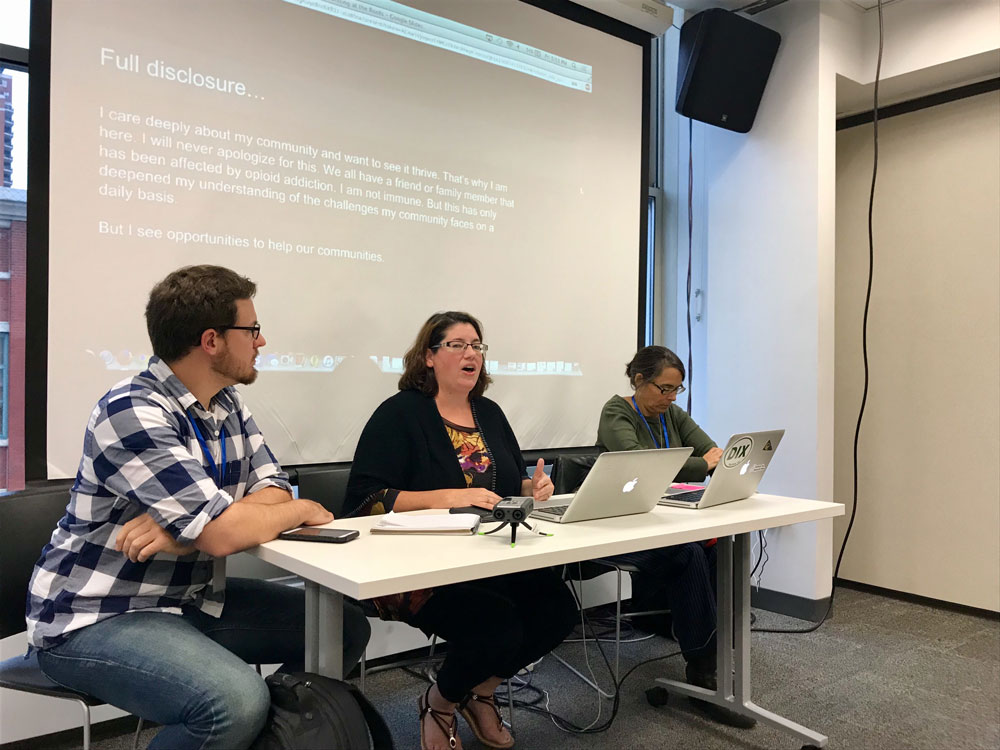Covering the opioid crisis: Move away from ‘disaster porn,’ focus on solutions
There are few news topics that seamlessly apply as both a national and local issue. The opioid addiction crisis is

There are few news topics that seamlessly apply as both a national and local issue. The opioid addiction crisis is one of them.
However, the prevalence of the issue is not a reason for local journalists to hide behind it. Instead, a panel of veterans speaking about their opioid crisis coverage at Friday’s LION Summit encouraged journalists to dive in headfirst.
“Like many of you guys, we started these news sites because we care deeply about the community and we’re not immune to the things we end up covering,” said Denise Lockwood, owner of Racine County Eye in Wisconsin. “Personal experience has deepened my understanding, and allowed me to catch on to where the systemic issues are.”
Lockwood was joined on the panel by Tom Sofield of Levittown Now in Pennsylvania, and Rose Hoban of North Carolina Health News. Like many local communities across the country, the three panelists grapple with new ways to cover a crisis that spans across decades.
“We’re not going to stop writing, but we’re not going to overwrite,” Lockwood said. “We have the opportunity to get at the roots of writing about people with opiate addiction issues.”
In Racine, a shortage of psychiatric care, lack of employability, a shortage of police while an overpopulation in jails, and a lack of education feed into the community’s addiction crisis. According to the National Council on Behavioral Health, 66 percent of the United States has a shortage of psychiatric care.
The challenge comes from tackling the problem from a different angle. In particular, profiling the story of addicts is quickly becoming a cliche.
“There are lots of sob stories, lots of drama, and I’m feeling like at this point if you’re still writing those stories, it’s disaster porn,” said Hoban.
“There’s another angle for your state,” she continued. “What other epidemics are out there that might be ignored? Lay this stuff bare.”
Instead, Hoban said, journalists need to stop writing stories about the problem and start writing stories about people addressing the problem. For Sofield, it means going back to the voices of the community.
“We live here, we work here, let’s cover it like residents talk about it,” Sofield said. “We’re using articles to explain the issue, and people seem to be coming around. This is a problem that affects all types of people.”
Brittany Shock is a reporter at the Richland Source.
Sign up for the weekly newsletter
Join the LION mailing list to get our weekly roundup of opportunities and resources for news entrepreneurs. View our most recent issues.
Related Articles
BoiseDev’s winning secret to selling newsletter ads: Only local news, only local ads
The site earns 60 percent of its advertising revenue through its high-open-rate email projects, in partnership with local ad agencies.
AI adoption: How Lede AI helps small publishers quickly generate content readers love
Helping news organizations leverage artificial intelligence with a tool that puts their readers and staff first
Social is down, newsletters are up: How audiences are finding LIONs in 2024
Changes to social media and search prompt publishers to shift strategy.
